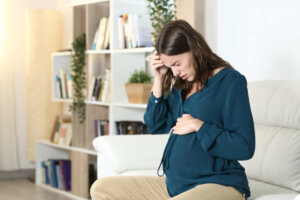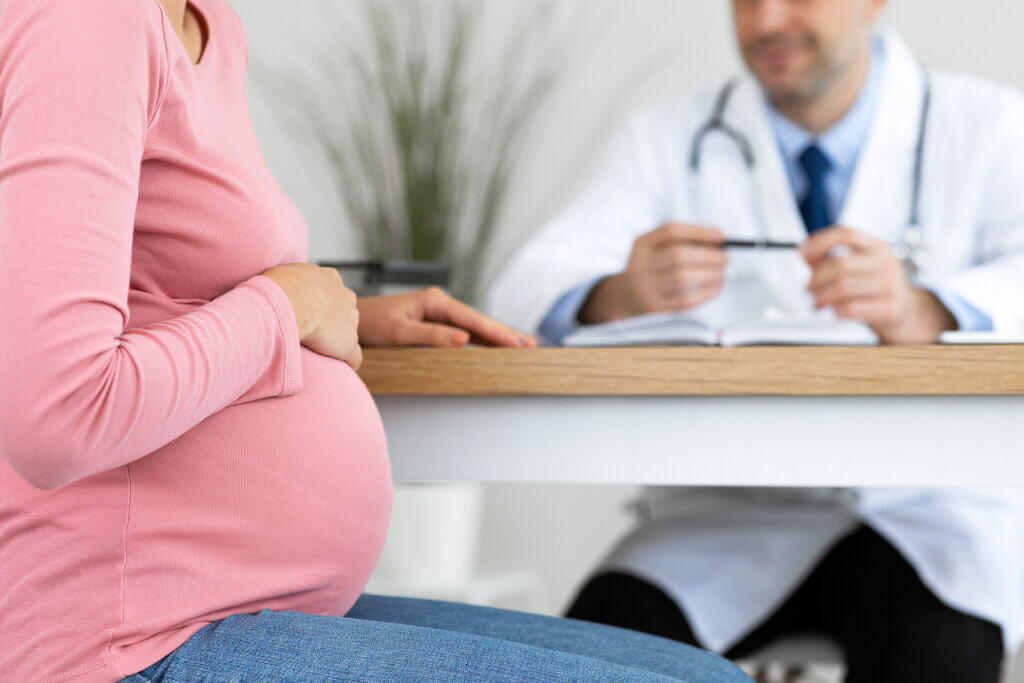Hypothyroidism and Pregnancy: How Are They Related?

Hypothyroidism and pregnancy coexist in up to 0.5 to 2.5% of all pregnancies. The frequency is higher when talking about women with risk factors such as carriers of autoimmune diseases.
Thyroid hormones are essential for development from the fetal stage to adulthood. During pregnancy, there’s a growth of up to 40% in the size of the thyroid gland that is associated with an increase in thyroid hormone production of up to 50%.
That’s why pregnancy is a stage in a woman’s life when a greater intake of iodine is required to be able to supply the demand for thyroid hormones. Thyroid dysfunction is the most prevalent endocrine disorder during pregnancy after gestational diabetes.
Thyroid hormones in pregnancy

In the first trimester of pregnancy, the development of the fetus, especially the neurological one, is dependent on the thyroid hormones produced by the mother while a progressive fetal contribution is produced. But it isn’t until the 16th to 20th week of gestation that fetal production is sufficient.
During pregnancy, as a result of the increased demand for thyroid hormone, there’s also an increase in thyroxine-binding globulin (which allows its transport in the blood) due to the increase in estrogen concentration, as well as stimulation of the thyrotropin receptor mediated by human chorionic gonadotropin.
The combination of both means that, regardless of the increase in thyroid hormone, there’s a decrease in the free fraction of thyroid hormone (it’s bound to thyroxine-binding globulin), which in turn leads to stimulation of the hypothalamic-pituitary-thyroid axis.
Hypothyroidism and pregnancy: associated symptoms
Despite the fact that hypothyroidism and pregnancy are related, in almost all endocrine disorders during pregnancy symptoms usually manifest in only 0.5% of women.
Thyroid function screening should be performed on all pregnant patients at their first prenatal visit. The diagnosis of hypothyroidism, clinical or subclinical, is characterized by increased levels of thyroid-stimulating hormone with low levels of thyroxine.
The normal value of these hormones is taken in reference to population standard values in each of the trimesters of pregnancy. When population eigenvalues aren’t available, the proposed upper limit is 4 mIU/L or thyroid-stimulating hormone higher than 10 mIU/L. Thyroid hormone values are independent in this case.
It can be asymptomatic or occur with vague symptoms
Hypothyroidism and pregnancy is usually asymptomatic in up to 20% of patients. If there are symptoms, they can be confused with those that are typical of pregnancy such as fatigue, constipation and swelling, since they also tend to appear insidiously. Other symptoms that are attributed to hypothyroidism and pregnancy are the following:
- Lack of physical strength
- Cold intolerance
- Weight gain
- Presence of dry or rough skin and hair
- Deep voice
- Slowness in the articulation of words and in thought
Complications associated with hypothyroidism and pregnancy
Women with hypothyroidism in pregnancy are at risk of obstetric and fetal complications such as:
- Hypertensive pregnancy disorder
- Gestational diabetes
- Premature rupture of membranes
- Placental abruption
- Premature delivery
- Intrauterine growth restriction
- Low birth weight
- Postpartum hemorrhage
- Increased risk of admission to the neonatal intensive care unit
- High risk of caesarean section and fetal death
The treatment of hypothyroidism and pregnancy is hormonal
Treatment of hypothyroidism and pregnancy is with thyroid hormone replacement:
- Clinical hypothyroidism: 1.6 μg/kg/day of levothyroxine.
- Subclinical hypothyroidism: With thyroid-stimulating hormone levels between 2.5-4.0 mIU/L, start with 50 μg per day, with thyroid-stimulating hormone levels > 4.0 mIU/L, 1.0 μg/L is suggested. kg/day of levothyroxine and in patients with TSH between 2.5-4.0 mIU/l and with positive antithyroid antibodies, administer 50 μg of levothyroxine per day.
In patients that have hypothyroidism prior to pregnancy, an increase in the dose between 25 and 50% is usually required. To increase the production of thyroid hormones in hypothyroidism and pregnancy, adequate iodine intake must be guaranteed.
Risk factors in hypothyroidism and pregnancy

Among the risk factors associated with hypothyroidism in pregnancy are the following:
- Maternal age greater than 30 years
- Family history of hypothyroidism or autoimmune thyroid disease
- Positive antithyroid antibodies
- History of diabetes mellitus or autoimmune disease
- Preterm labor or prior miscarriages
- Thyroid surgery or radiation therapy to the head and neck
- It lives in iodine-deficient regions
Hypothyroidism in pregnancy should be detected as soon as possible
Hypothyroidism is the second endocrine disorder of pregnancy, and its early diagnosis, as well as its treatment in the subclinical period, prevents obstetric and fetal complications, so it is important to implement thyroid hormone screening in prenatal consultation.
Hypothyroidism and pregnancy coexist in up to 0.5 to 2.5% of all pregnancies. The frequency is higher when talking about women with risk factors such as carriers of autoimmune diseases.
Thyroid hormones are essential for development from the fetal stage to adulthood. During pregnancy, there’s a growth of up to 40% in the size of the thyroid gland that is associated with an increase in thyroid hormone production of up to 50%.
That’s why pregnancy is a stage in a woman’s life when a greater intake of iodine is required to be able to supply the demand for thyroid hormones. Thyroid dysfunction is the most prevalent endocrine disorder during pregnancy after gestational diabetes.
Thyroid hormones in pregnancy

In the first trimester of pregnancy, the development of the fetus, especially the neurological one, is dependent on the thyroid hormones produced by the mother while a progressive fetal contribution is produced. But it isn’t until the 16th to 20th week of gestation that fetal production is sufficient.
During pregnancy, as a result of the increased demand for thyroid hormone, there’s also an increase in thyroxine-binding globulin (which allows its transport in the blood) due to the increase in estrogen concentration, as well as stimulation of the thyrotropin receptor mediated by human chorionic gonadotropin.
The combination of both means that, regardless of the increase in thyroid hormone, there’s a decrease in the free fraction of thyroid hormone (it’s bound to thyroxine-binding globulin), which in turn leads to stimulation of the hypothalamic-pituitary-thyroid axis.
Hypothyroidism and pregnancy: associated symptoms
Despite the fact that hypothyroidism and pregnancy are related, in almost all endocrine disorders during pregnancy symptoms usually manifest in only 0.5% of women.
Thyroid function screening should be performed on all pregnant patients at their first prenatal visit. The diagnosis of hypothyroidism, clinical or subclinical, is characterized by increased levels of thyroid-stimulating hormone with low levels of thyroxine.
The normal value of these hormones is taken in reference to population standard values in each of the trimesters of pregnancy. When population eigenvalues aren’t available, the proposed upper limit is 4 mIU/L or thyroid-stimulating hormone higher than 10 mIU/L. Thyroid hormone values are independent in this case.
It can be asymptomatic or occur with vague symptoms
Hypothyroidism and pregnancy is usually asymptomatic in up to 20% of patients. If there are symptoms, they can be confused with those that are typical of pregnancy such as fatigue, constipation and swelling, since they also tend to appear insidiously. Other symptoms that are attributed to hypothyroidism and pregnancy are the following:
- Lack of physical strength
- Cold intolerance
- Weight gain
- Presence of dry or rough skin and hair
- Deep voice
- Slowness in the articulation of words and in thought
Complications associated with hypothyroidism and pregnancy
Women with hypothyroidism in pregnancy are at risk of obstetric and fetal complications such as:
- Hypertensive pregnancy disorder
- Gestational diabetes
- Premature rupture of membranes
- Placental abruption
- Premature delivery
- Intrauterine growth restriction
- Low birth weight
- Postpartum hemorrhage
- Increased risk of admission to the neonatal intensive care unit
- High risk of caesarean section and fetal death
The treatment of hypothyroidism and pregnancy is hormonal
Treatment of hypothyroidism and pregnancy is with thyroid hormone replacement:
- Clinical hypothyroidism: 1.6 μg/kg/day of levothyroxine.
- Subclinical hypothyroidism: With thyroid-stimulating hormone levels between 2.5-4.0 mIU/L, start with 50 μg per day, with thyroid-stimulating hormone levels > 4.0 mIU/L, 1.0 μg/L is suggested. kg/day of levothyroxine and in patients with TSH between 2.5-4.0 mIU/l and with positive antithyroid antibodies, administer 50 μg of levothyroxine per day.
In patients that have hypothyroidism prior to pregnancy, an increase in the dose between 25 and 50% is usually required. To increase the production of thyroid hormones in hypothyroidism and pregnancy, adequate iodine intake must be guaranteed.
Risk factors in hypothyroidism and pregnancy

Among the risk factors associated with hypothyroidism in pregnancy are the following:
- Maternal age greater than 30 years
- Family history of hypothyroidism or autoimmune thyroid disease
- Positive antithyroid antibodies
- History of diabetes mellitus or autoimmune disease
- Preterm labor or prior miscarriages
- Thyroid surgery or radiation therapy to the head and neck
- It lives in iodine-deficient regions
Hypothyroidism in pregnancy should be detected as soon as possible
Hypothyroidism is the second endocrine disorder of pregnancy, and its early diagnosis, as well as its treatment in the subclinical period, prevents obstetric and fetal complications, so it is important to implement thyroid hormone screening in prenatal consultation.
Machia C, et al. Hipotiroidismo en el embarazo. Rev Colomb Obstet Ginecol 2007;54(4). Disponible en www.scielo.org.co/scielo.php?script=sci_arttext&pid=S0034-74342007000400009.
Muñoz C, et al. Hipotiroidismo y embarazo. An Med Asoc Hosp ABC 2019;64(2). Disponible en https://www.medigraphic.com/cgi-bin/new/resumen.cgi?IDARTICULO=87594.
Núñez N. Hipotiroidismo en el embarazo. Revista Médica de Costa Rica y Centroamérica 2016;73(620). Disponible en https://www.medigraphic.com/pdfs/revmedcoscen/rmc-2016/rmc163ao.pdf.
Rueda M, Builes C. Medicinaylaboratorio 2022;26(1). Disponible en https://medicinaylaboratorio.com/index.php/myl/article/view/557/501.
Este texto se ofrece únicamente con propósitos informativos y no reemplaza la consulta con un profesional. Ante dudas, consulta a tu especialista.







